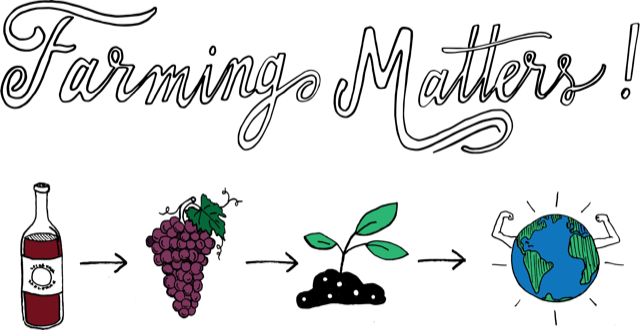
Ever since we opened in July 2015, sourcing organic and “natural” wines from small producers has been a very strong focus for us. We’ve asked winemakers and distributors a LOT of questions about sustainable practices in the vineyard and in the winemaking process itself. Our team always wants to feel really good about the kinds of wines we sell and serve to you, and we see it as doing our small part in creating a healthier planet.
Since December 2019, Esters and our entire restaurant group have taken things a step further by committing to only sourcing from producers who engage in planet friendly practices. We’ve broken this down into 6 categories—certified organic, practicing organic, biodynamic, dry-farmed, no-till and regenerative. And now, in an effort to be more transparent with our guests, we’ve created a little key on all our menus and stickers for our bottles so you know which methods that winemaker implements. We hope this inspires you to ask questions, learn and support other winemakers and farmers who share this commitment to soil health!
- Certified Organic (CO) – Farming without the use of chemical fertilizers, pesticides or other artificial agents, with official certification.
- Practicing Organic (PO) – Follows the practices, but doesn’t have official certification from their country, as this can be a very expensive process for small farmers and winemakers. They’re still doing the important work though!
- Biodynamic (B) – A holistic, spiritual way of farming beyond organic. Everything in the vineyard is interconnected, working in harmony with the sun, the stars and the moon.
- No-Till (NT) – Farming without tilling or plowing. This method doesn’t disturb the soil or leave it bare. It decreases erosion, runoff and weeds, AND it’s a way of sequestering carbon.
- Dry-Farmed (DF) – Vines cultivated without irrigation. Farmers plant a variety of drought-resistant cover crops that are mulched into the land during rainy periods.
- Regenerative (R) – A way of farming that renews and heals the land. It builds soil fertility, ecosystem diversity and draws carbon down from the atmosphere through cover crops, crop rotations, compost and animal manures. This method incorporates ALL of the other farming tenets mentioned, and it’s one of the key ways to reduce global warming.
So do we have natural wines? Absolutely. We believe in the principles behind the natural wine movement. We also love wine that’s free of flaws and represents the place that it’s from. Essentially, we believe that great wine is made in the vineyard and that’s best preserved with low-impact winemaking.
